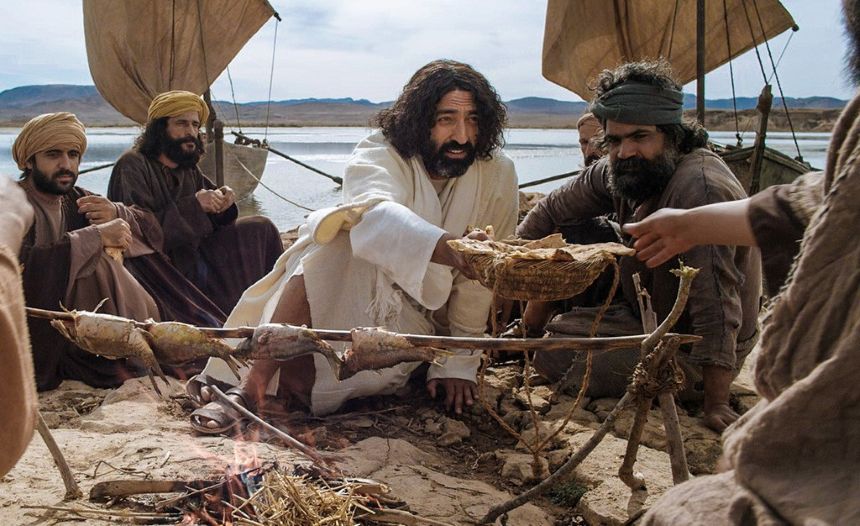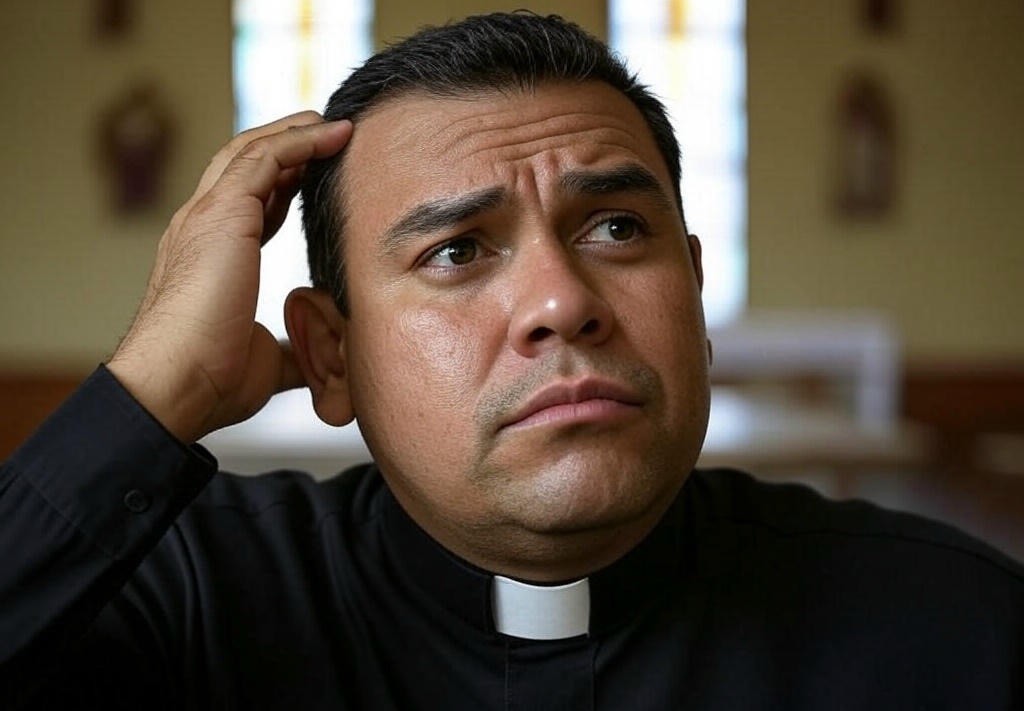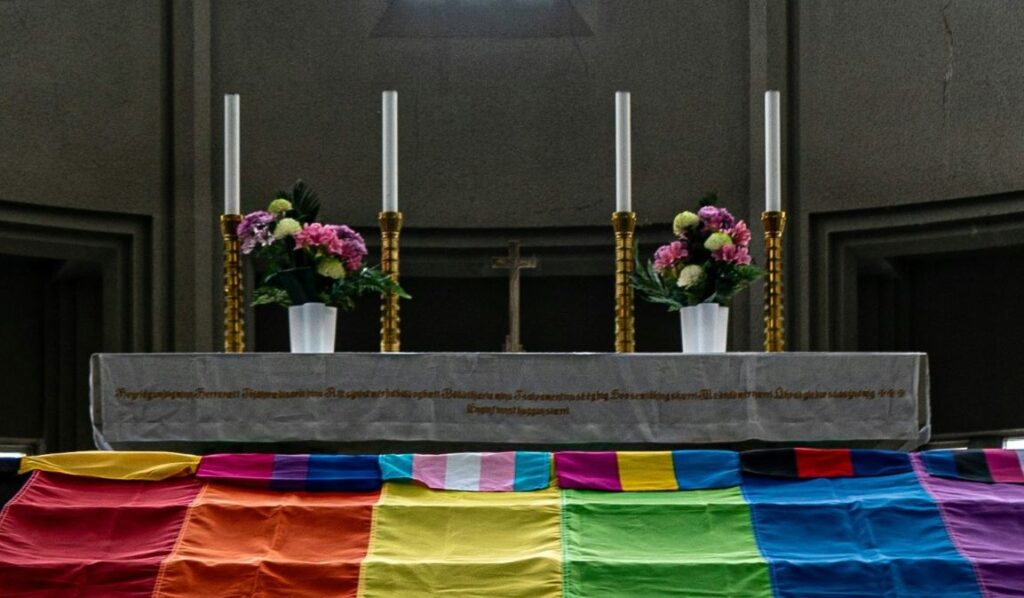
I’ve sometimes wondered what it must have been like to be one of Jesus’s first disciples. I no longer hold the somewhat romantic image I once did — the vision of a gang of unsuspecting novices captivated by Jesus’s words wandering along the shores of the Sea of Galilee, and their chats by a campfire on the beach or in the house of a Pharisee or tax collector… But until recently, one thing that I did assume is that they would have received a pretty comprehensive education. Three years alongside the master should have prepared them for anything the future would throw at them, right?

Image courtesy of Lumo Project Films.
Apparently not.
What Jesus didn’t tell them
Why, for example, did Jesus never warn the apostles about the controversy over circumcision that would soon shake the growing Christian community? In fact, he never once addressed the issue that later sparked such fierce debate. Would it really have been so hard to authorize them to abandon this Mosaic mandate and welcome Gentiles without requiring circumcision?
As far as we can tell, Jesus had no intention whatsoever of providing a set of rules or guidelines that, once memorized, would apply to any and every future situation his followers might face. Rather, he wanted to provide them with a lived example of how to behave and relate to people in a wide range of circumstances — most of which would end up challenging the traditions and stereotypes that fuelled their convictions. He taught them principles and values, urging them to develop the ability to hear God’s voice and recognize the movement of the Spirit in unfamiliar situations. The opportunity, and necessity, for this discernment would soon arise.
After the events of Pentecost, people from a variety of backgrounds gradually joined the Christian community. They were no longer just “Galilean men” (Acts 1:11). Jews from Jerusalem and Judea, including some priests, embraced the new faith. Likewise, others from the Greek-speaking diaspora appeared on the scene, producing a new dynamic that required creative and courageous decisions. We are aware (with a little help from John) that “Jews do not associate with Samaritans” (John 4:9, NIV [1]). So, the expansion into Samaria by Philip surely caused discomfort among some in a church that, at the time, was effectively just another Jewish sect. But it is in chapter 10 of the Acts of the Apostles that we reach a critical moment.
Let me interrupt the narrative for a moment. What does all this have to do with a blog about same-sex relationships? Let’s see…
Confronting new realities

Image created with Grok.
Throughout its history, the church has faced moments that have challenged its received or traditional understanding, and the theological stances or scriptural interpretations underpinning this. Through a process of dialogue, listening (especially to actual lived experience) and reflection, in humility and openness, albeit not without visible and significant internal struggles, long-held dogmas and beliefs have been evaluated, tweaked, or rejected.
Among others, we could mention heliocentrism, the divine right of kings, evolution, the age of the Earth, the role of women in church and society, the abandonment of pacifism, corporal and capital punishment, divorce, polygamy, antisemitism, white and Western cultural superiority, slavery, the use of contraceptives… The impetus for these sweeping changes did not arise within the church itself, but generally sprang from the conflicts experienced when facing new ideas or diverse practices in the societies in which the church found itself. Nonetheless, the testimony of people’s personal experiences and evidence from the natural world forced a re-examination of deeply rooted convictions previously perceived as “biblical”.

Photos by NASA, Prince Kwembe and Simon Berger on Unsplash.
Today, in the light of current sociocultural shifts and scientific research, we face a different issue. But while it may seem radical, questioning traditional interpretations around homosexuality and homoerotic relationships has its precedents. Admittedly, the subject reflects our current context, but within church history itself, being forced into a costly process of re-evaluation with the potential to change theological understanding is nothing new.
Fortunately, Scripture offers us examples of similar processes that can serve as paradigms. Without these bold steps of innovation, the gospel would never have progressed beyond the boundaries of the Jewish Semitic cultural basin and taken root in the Greco-Roman world of the time. And we, for the most part Gentiles, would never have come to know Christ.
Now, after this brief detour that hopefully will have provided some needed clarification, let’s return to Acts chapter 10…
The inclusion of the Gentiles
Luke firstly introduces us to a man named Cornelius, commander of a Roman battalion in Caesarea. Though considered devout and God-fearing [2], he was a non-Jew, a Gentile, a pagan.

Image by Stockcake.
God doesn’t seem too bothered by his uncircumcised status. Not only does he affirm that Cornelius’s prayers reach him, but gives him a specific message, name and address included, about the man he was to send for: Simon Peter. Meanwhile, Peter is two days away in Joppa. Just before Cornelius’s envoys arrive, as Peter is praying and waiting for his meal to be prepared, he has a vision in which he hears the puzzling words, “Do not call anything impure that God has made clean” (Acts 10:15). This leaves him confused and defensive, leading him to utter the words “Surely not, Lord!”, a phrase that overflows with the inner tension he was experiencing.
It’s no surprise that Peter didn’t know what to think. The Levitical laws about what one could or couldn’t eat were clear, and their practical application deeply ingrained in Jewish tradition and daily life. Customs based on the pursuit of ritual purity dictated not only diet but also those considered acceptable dining companions for every Jew, effectively turning each meal into an act of obedience to God.

Image by Stockcake.
How on earth does God now appear to be saying the opposite? To share a meal and dip bread into the same bowl as an uncircumcised, unclean Gentile who ate anything and everything was, quite simply, unthinkable.
Nevertheless, Peter gathered a few companions together and returned with Cornelius’s envoys to the centurion’s home. God didn’t even wait for Peter to finish his sermon. To the amazement of the Jewish believers God brought the whole event to an unexpected climax: “the Holy Spirit came on all who heard the message” (v. 44). Their astonishment wasn’t emotional or social; it was because “the gift of the Holy Spirit had been poured out even on Gentiles” (v. 45). Faced with this undeniable evidence of divine acceptance, a new chapter opened in the church’s history: “Can anyone withhold water for baptizing these people, who have received the Holy Spirit just as we have?” (v. 47, ESV [3]).
Of course, that wasn’t the end of it. Peter had to defend himself against accusations of heresy from Christians in Jerusalem. And the implications of this inclusion, especially the disregard for the Mosaic command of circumcision, soon sparked “serious conflict”. It’s worth noting too that Peter’s action didn’t eliminate the need for subsequent theological work; Acts 15 and significant parts of Paul’s letters document this laborious process.
And Peter? The fact that he later reverted to his old ways, refusing to eat with Gentile believers in Antioch (Galatians 2:11‑14), testifies to the deep internal struggle he faced. We mustn’t forget that not even those three years alongside the master had been enough to break his firm conviction, verbalised on meeting Cornelius, that “it is against our law for a Jew to associate with or visit a Gentile” (Acts 10:28). So, it’s perhaps to be expected that even the personalized revelation from God he experienced in Joppa and the direct action of the Holy Spirit witnessed in Cornelius’s house didn’t make him immune to doubt.
Now it’s our turn
Given Peter’s difficulties, we shouldn’t be surprised if we struggle too. Even so, God invites us to be sensitive to the movement of the Spirit in people and contexts that don’t fit into our theological frameworks; to let go of our prejudices and open ourselves, despite historical exclusion, to the lived experience of LGBTQ+ people and God’s grace at work in them. Knowing we still need to dedicate time to theological reflection, will we be able to say, with Peter:

Photo by Rod Long on Unsplash.
“Can we withhold communion from these LGBTQ+ people, who have received the Holy Spirit just as we have?”
![]()
| Neil Rees worked with an international missionary organization for 27 years, during which time he helped with churches and church plants in Spain and North Africa, before taking on the role of international director. He subsequently served as the pastor of an evangelical church in the town of Ormskirk, in the northwest of England. He has an MA in international development and is the author of one book, published in English under the title Not Everything in Our Bibles Is Inspired [4]. He has been actively involved in initiatives to promote LGBTQ+ inclusion in the Church. He is currently based with his wife, Lynn, in Extremadura, Spain, from where he participates in Bible training and Christian leadership programmes, works with local believers and helps out at a couple of nearby churches. |
📌 If you would like to comment on this post (in the language of your choice), you can do so at the end of the Spanish version, here.
Notas
[1] NIV: The Holy Bible, New International Version® (Anglicised), NIV®, copyright © 1979, 1984, 2011 by Biblica, Inc.®, used by permission of Biblica, Inc.®; all rights reserved worldwide. Unless stated otherwise, all Bible quotes in this post are from the NIV.
[2] These expressions were used to refer to people who believed in the God of Israel but had not taken the step of converting. They were allowed to participate in prayers in the synagogues but were still considered “impure” individuals. For men, the essential step to becoming a proselyte was circumcision, which, in the Greco-Roman world, represented an unthinkable barrier for the vast majority.
[3] ESV: The Holy Bible, English Standard Version, © 2001 by Crossway Bibles, a division of Good News Publishers. Used by permission. All rights reserved.
[4] Published in English in 2007 by Kingsway (Eastbourne, United Kingdom). The book was originally published in Spanish by Misión Horizontes (Horizontes América Latina) in 2000, with the title ¡¿No todo lo que hay en nuestras biblias es inspirado por Dios?!
